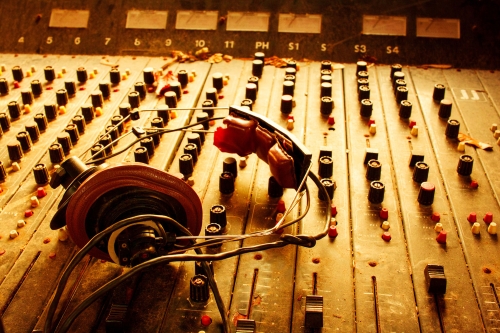ProSoundWeb: Growing up, I’d stay awake each New Year’s Eve to watch the telecast of the Times Square ball drop. It was always a bright, colorful spectacle.
In my teens, I visited Times Square in person. Standing in the middle of New York City, my gaze followed someone’s pointed finger towards the top of a distant building. “That’s where the ball drops.”
Really? How underwhelming.

4 comments:
Articles like this one make me painfully aware of two things: how much thought goes into sound design that muggles will never understand, and that in the world of sound design I am a muggle. From school and theatrical projects I have some experience dealing with the issue of room sound, but I realized reading Altrove's reflection on live recording that I definitely take for granted how much careful planning goes into the sound design for a single event, although I guess that makes sense given that sound design is an entire major. For me, the most interesting part of this article is that in live recordings of events, sound designers use similar techniques as theatrical design in that they put mics everywhere, and that doing so actually helps focus the sound. I was also really surprised that sound designers purposefully mic the audience. I had always assumed that mics on the focus picked up sufficient ambient noise. Overall, I am just always kind of surprised when I read articles about sound design because I always think I know what sound designers do and without fail am blown out of the water.
I’ve never really thought about the governing philosophy of a production before. This article tackles this conversation in an interesting way. Considering the evolution of how creating music in a recording studio works, it was once about throwing people into a space and just playing the music as it is, and now it's much more about using electronic enhancement such as pitch correction, quantization, and overdubs to create a recording. Some of these practices have also seeped into live performances. That fact that psycho acoustically we can refocus our auditory perception, as this author describes, and he used the example of the cocktail party effect. We have to recognize that often what people think they want to hear is not actually what they want to hear. Live recordings need to be modified greatly because often the space will give a live recording unwanted reverb or odd acoustic qualities. This author suggests minimizing the contribution of a venue’s acoustics and replacing it with artificial reverb that suits the purpose of whatever you’re doing. Pretty cool stuff.
This article explains a lot about live recording that I had been wondering about. A couple of years ago, I learned that an acquaintance had bought a truck and was outfitting it to start a business doing live recordings at concerts. Our other colleagues were amused and concerned because what was once a niche business in high demand is now more or less obsolete due to advancements in technology. That part made sense to me, but I was missing the details outlined in this article about the process to develop releasable tracks from live recording. It is interesting to consider the ways in which the person mixing the track edits everything to create a sound that is more alive. On the page, it all sounds fairly intuitive, but I can also tell that all the decisions the the author makes come from years of experience and close attention to details.
In most cases, I share this same opinion about watching something live on TV versus watching it in person. It is often more engaging (and comfortable. and cheaper.) to just watch it on TV. I grew up in a big football family, and while it's always energizing to be in the stadium amongst screaming fans, it's also kind of difficult to follow such a fast paced and meticulous game without listening to commentators, having zoomed in shots, or having writing on the screen that breaks down the plays. On that same note, my dad actually operated the headsets between the head coach and the quarterback for the Saints, so he got to watch every home game from the sidelines. I remember watching from home and texting him things like "omg that play must've been so cool to watch from that close" and he almost always replied with "I'd rather be at home watching it on a TV". Even from his perspective that only a select people get to have, there's something about live television that makes life easier. When you think about it, the cameras and sound technicians do all of the hard work for you. You don't have to strain your eyes to try to concentrate on what's actually important (like the Times Square ball that is actually pretty small in proportion to all the hype). Also, you don't have to try to hear over all of the screaming fans. That said, I agree with this article on the topic of convenience.
Post a Comment